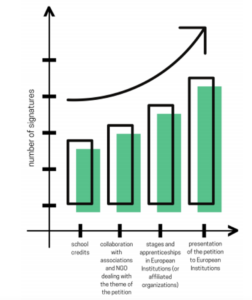
The European Student Think Tank are delighted and honoured to share the five winning entries of the Europe Direct “L’ Europa che Vorrei” essay competition, featuring the very best in creative policy solutions from high-school students from around Europe. In compiling these pieces, we have been inspired by the range and innovativeness of these answer, particularly the ways in which emerging technologies have been repurposed to building a stronger democracy.
Congratulations to all the winners. Hopefully we will see you applying to be part of EST in the coming years, and beyond that adding your unique thoughts and skills to the Commission itself.
How Might the Dialogue between Young Citizens and European Institutions be Optimized?
Written by Laetitia Margiotta
Since intercultural projects, such as Erasmus+, are increasingly popular and fruitful among young people, it is undeniable that, in recent years, the connection between the European Union and the aforementioned section of society has markedly strengthened. However, in terms of productive communication, a great number of adolescents are adamantly convinced that the current dialogue with European Institutions is insufficient to make their voice effectively heard. On account of this, and with the purpose of nourishing young people’s euro-optimism, it is vital to respond actively to juvenile exigences by promoting avant-garde ventures and inclusive projects.
The kernel of my proposal is launching “Petitioning”, an innovative social network designated for the exclusive publication of petitions.

In greater detail, this application will present the following characteristics:
- Subscription to ‘Petitioning’ is allowed for interested parties who are between 16 and 25 years old
- Petitions are the only available content, and each user can both post and sign an unlimited amount of petitions;
- As it is possible to interact privately with other advocates, this additional facility will offer users the ability to affiliate themselves. As a result, “Petitioning” will also act as a meeting point for the creation of projects and associations;
- The more signatures a petition collects, the better. Indeed, depending on the number of collected signatures, the proponents have the possibility to earn rewards. Here is the graphic explanation of how prizes can be assigned according to the amount of gathered signatures:
As the number of signatures grows, the prestige of the award increases, ranging from school credits to the unique opportunity to present his own petition to European Institutions. Intermediate awards could include collaboration with associations and NGOs, which deal with the theme of the petition, and participation in apprenticeships in European Institutions (or affiliated organizations).
All things considered, I am firmly convinced that this drafted proposal, prior completions and amendments, could lead to a significant turning point in the history of Europe. It will represent the tangible proof that European Institutions have confidence in young citizens, to the point that they give them an active role in international policy. Personally, I am led to believe that, in order to invigorate the hopes of a young society who oftentimes feels disregarded, it is necessary to free young people’s initiative and reward them for their contribution and sensitivitytowards European issues.
In conclusion, I am of the view that this venture can be conceived of as a beneficial opportunity both for young people, who could finally make their voices heard, and for European Institutions, having the possibility to identify and shape the politicians of the future.
“Dear student, imagine that you have been called by the European Commission since it is about to write a program of interventions that have to be realized in the near future. What practical proposal would you suggest to it in order to improve the dialogue between young people and European institutions?”
Written by Giulia Stella – Giambattista Vico Linguistic High School, 5L, Ovidio Institute, Sulmona. (The original composition was written in German*)
Unification is one of the fundamental principles of the European Union. The trust in this foundation has led to the unification of 27 countries, which, from its starting point of economic cooperation, has established an organization that operates in different sectors.
In my opinion, one of the most important and decisive steps of genuine integration (albeit economic) came in standardising and simplifying trade through the introduction of a single currency: the euro.
This initially drastic change led to numerous advantages and the monetary integration of almost all member countries. The way to unite young people in the European Union is to make them feel part of a single nation: Europe. We should follow the example of the currency as a solution, that is, adopt a single European language, new generations have grown up with the euro only but future generations will use a European language. I believe that language is the driving force for real integration because, today, listening to someone who speaks your same language gives a sense of belonging.
For me, this is the defining attitude towards a truly united Europe.
*Die Vereinigung ist ein der Grundprinzipien der Europäischen Union. Das Vertrauen in dieser Stiftung hat zur Vereinigung von 27 Ländern geführt, die ausgehend von der wirtschaftlichen Zusammenarbeit eine Organisation aufgebaut hat, die in verschiedenen Sektoren tätig ist.
Meiner Meinung nach kam einer der wichtigsten und entscheidenden Schritte einer echten Integration (wenn auch nur wirtschaftlicher Art) aus der europäischen Finanzwelt, indem der Handelsaustausch durch die Einführung einer einheitlichen Währung vereinheitlicht und vereinfacht wurde: der Euro.
Diese zunächst drastische Veränderung führte zu zahlreichen Vorteilen und zu einer monetären Integration fast aller Mitgliedsländer. Der Weg, junge Menschen in der Europäischen Union zu vereinen, besteht darin, ihnen das Gefühl zu geben, Teil einer einzigen Nation zu sein: Europa. Wir sollten dem Beispiel der Währung als Lösung folgen, d.h. eine einheitliche europäische Sprache annehmen, da die neuen Generationen nur mit der Euro-Währung aufgewachsen sind und künftige Generationen eine europäische Sprache verwenden
werden. Ich glaube, dass die Sprache der Antrieb für echte Integration ist. Denn heute, jemandem zuzuhören, der deine selbe Sprache spricht, vermittelt ein Gefühl der Zugehörigkeit.
Das ist für mich der bestimmende Standpunkt eines echten vereinten Europas.
Written by Scudieri Ravi – I.I.S. A.SERPIERI, Pratola Peligna (The original composition was written in Italian*)
I have always heard of the European Union and I have often wondered what are the objectives that this same Europe wanted to pursue and make known, especially to the new generations. I assume that I know, at least in part, what the problems are, but honestly I have never been in the heart of this context. More often than not, however, I learn that not all countries have a conception of seeing things in a positive way, some people think only of their own interests.
I often hear people talking about Brussels, but very rarely I have heard a discussion about the delicate issue of Greece and other countries in disadvantaged economic situations. Not to mention how others, instead, touch the sore wound of immigration. But what is most disconcerting to me is to know that many countries remain indifferent and blind to all this, and I often believe that not pretending to see is the best solution to any serious problem.
Then politics must take responsibility and create a bridge with young people, proposing for example online meetings with schools at least once a month, for an active and even heated confrontation that can produce innovation and continuous participation. In short, a function that would exist in all real numbers, where the numbers, after all, are us. Perhaps we should all reread the work of the French Julien Freund, to get closer to what he defined the essence of politics. Therefore I think we need a Recovery Freund too!
* Ho sempre sentito parlare di Unione Europea e mi sono spesso chiesto quali fossero gli obiettivi che questa stessa Europa voleva inseguire e far conoscere, soprattutto alle nuove generazioni. Io presumo di sapere, almeno in parte, quali siano le problematiche, ma sinceramente non sono mai entrato nel vivo di questo contesto. Più delle volte, però, vengo a conoscenza del fatto che non tutti i paesi hanno una concezione di vedere le cose in modo positivo, qualcuno pensa solo ai propri interessi.
Sento parlare sovente di Bruxelles, ma pochissime volte ho udito una discussione sulla delicata questione della Grecia e degli altri stati che versano in situazioni economiche svantaggiose. Per non parlare poi come altri,
invece, toccano con mano la dolente ferita dell’immigrazione. Ma ciò che più mi crea sconcerto è sapere che molti paesi rimangono indifferenti e ciechi dinanzi a tutto ciò, ed io spesso credo che il non far finta di vedere sia la soluzione migliore di fronte a ogni grave problema.
Allora la politica deve prendersi delle responsabilità e creare un ponte con i giovani, proponendo ad esempio incontri online con le realtà scolastiche almeno una volta al mese, per un confronto attivo e anche acceso che possa produrre innovazione e partecipazione continua. Insomma una funzione che così esisterebbe in tutti i numeri reali, dove i numeri, dopotutto, siamo noi. Forse tutti dovremmo rileggere l’opera del francese Julien Freund, per riavvicinarci a quella che lui definiva l’essenza della politica. Per cui credo che avremmo bisogno anche di un Recovery Freund!
Written by Segreto Serena – Giambattista Vico Linguistic High School, 5H, Ovidio Institute, Sulmona. (The original composition was written in French*)
Among various programs and interventions likely to improve the dialogue between young people and European institutions, I would propose, first of all, offering additional school courses aimed at deepening our knowledge of the European Union. Acting for something, in fact, cannot be possible without understanding it first. Consequently, knowledge must also be followed by experience.
Therefore, all students should have the opportunity to take a trip to Bruxelles, where the Parliament is located, to get closer to an “adult” topic like politics. The presence of a guide that can explain all different activities that take place there is necessary, in order to show everyone its importance. In addition, the European Union, having among its different objectives the guaranteeing of socioeconomic well-being, should ensure a significant involvement of regional and local institutions.
Through these reference figures young people can express their needs, in particular projects for environment’s protection and digitalization in schools, but also formation, productivity, social inclusion and the ability to adapt to future’s technological and environmental challenges. A great advantage over previous generations is undoubtedly the existence of alternative communication means that can be useful to reach a specific target of people. This is why I think it is fundamentally important to implement this type of communication in order to attract and actively involve young people.
* Parmi les différents programmes et interventions susceptibles d’améliorer le dialogue entre les jeunes et les institutions européennes, je proposerais tout d’abord des cours scolaires supplémentaires visant à approfondir les connaissances sur l’Union européenne. Agir pour quelque chose, en fait, n’est pas possible si vous ne le comprenez pas d’abord. Par conséquent, la connaissance doit également être suivie par l’expérience. Tous les étudiants devraient donc avoir l’opportunité de faire un voyage à Bruxelles, où le parlement est basé, pour se rapprocher d’un sujet “adulte” comme la politique. Il doit y avoir un guide qui peut expliquer les différentes activités qui se déroulent ici pour faire comprendre à chacun son importance. Par ailleurs, l’Union européenne ayant parmi ses différents objectifs celui de garantir le bien-être économique et social, il faudrait qu’il y ait une implication des institutions régionales et locales.
A travers ces chiffres de référence, les jeunes peuvent exprimer leurs besoins notamment: des projets pour la protection du territoire, la numérisation dans les écoles, ou leur formation, la productivité, l’inclusion sociale et la capacité à s’adapter aux défis technologiques et environnementaux du futur. Un grand avantage par rapport aux générations passées est sans aucun doute la présence de moyens de communication alternatifs aux moyens habituels, plus utiles pour atteindre une cible spécifique de personnes. C’est pourquoi je pense qu’il est important de mettre en œuvre ce type de communication, de manière à ce qu’il puisse nous attirer et nous impliquer activement les jeunes.
Written by Aular Abril – Giambattista Vico Linguistic High School, 5L, Ovidio Institute, Sulmona. (The original composition was written in Spanish*)
Good morning! I would like to take into account the situation between students and European institutions because in recent years students have felt distant from European institutions and several times have missed opportunities because of disinformation or lack of interest. Probably students have always seen institutions as something far from their lives. I am sure that opportunities have been offered by EU, but maybe information has been lacking. In order to bring students closer to the world of European institutions, I would propose the creation of an online platform where every student can sign in. The platform should share all types of information related to EU institutions and should include a specific area where students can present proposals aimed at ensuring more opportunities are given to young people. Every month, the most creative and interesting five proposals will be awarded prizes. Every proposal will be worth ten points and, once someone reaches the maximum value of fifty points, the European Commission will offer the chance for the young people to participate in meetings with one of the European institutions. In order to increase the online platform’s use among students, every student should reap from it some benefits concerning scholastic framework and according to each single school’s decisions. In this way students are prepared, from an early age, to build a Europe that could be suitable for their future and full of opportunities.
Buenos días, me gustaría tomar en consideración la situación entre los estudiantes y las instituciones europeas porque en los últimos años los estudiantes no han estado muy a contacto con las instituciones europeas y en muchas ocasiones han perdido oportunidades por causa de la desinformación o del poco interés. Probablemente en los últimos años la relación entre los estudiantes y las instituciones europeas no ha sido muy cercana, por lo que los estudiantes han siempre visto las instituciones como una cosa muy lejana. Las oportunidades seguramente no han faltado però quizás las informaciones han escaseado. Para acercar los estudiantes a todo lo que es mundo de las instituciones europeas, mi propuesta sería la de construir una plataforma online, donde cualquier estudiante pueda registrarse la cual sería únicamente reservada a informaciones sobre la instituciones y con una parte reservada a sugerencias o consejos que los estudiantes consideren útiles para tener más oportunidades. Cada mes serán elegidas las cinco propuestas más creativas e interesantes y cada propuestas tendrá el valor de diez puntos y con un máximo de cincuenta puntos la Comisión Europea dará la posibilidad de participar a reuniones con una de las instituciones elegidas. Para aumentar el uso de la plataforma online entre los estudiantes, cada alumno tendrá ventajas en ámbito escolástico a segunda de lo que decida su propia escuela. De este modo los estudiantes ya desde una pequeña edad estarán proyectados a construir, conocer y estructurar una Europa adecuada al proprio futuro para tener una vida llena de posibilidades.

 Is EU citizenship for sale – or for keeps? A critical analysis of the CJEU’s Golden Visa ruling.
Is EU citizenship for sale – or for keeps? A critical analysis of the CJEU’s Golden Visa ruling.  The European Union in Space: From exploration and innovation to security and autonomy
The European Union in Space: From exploration and innovation to security and autonomy  The Rise of the Right: The Threat Right-Wing Extremism Poses to Women and Feminist Efforts in Germany
The Rise of the Right: The Threat Right-Wing Extremism Poses to Women and Feminist Efforts in Germany  The silent shield – how special operations safeguard the global supply chain
The silent shield – how special operations safeguard the global supply chain 



